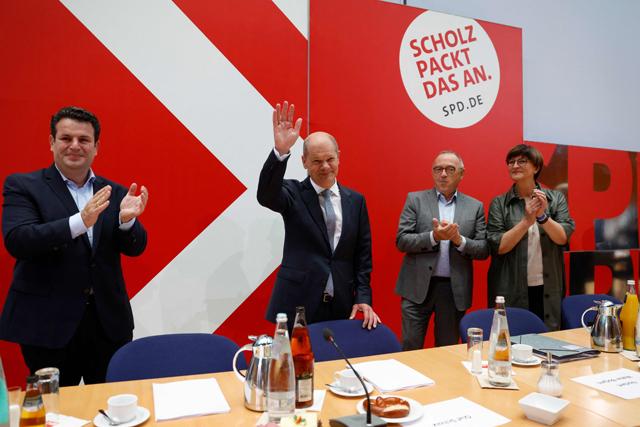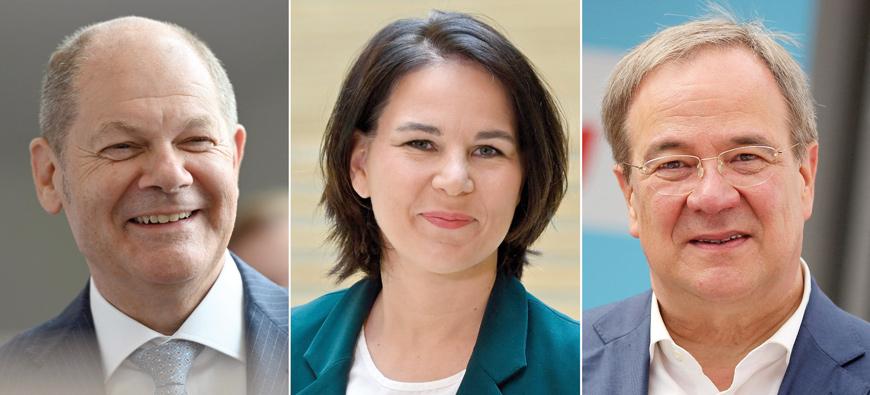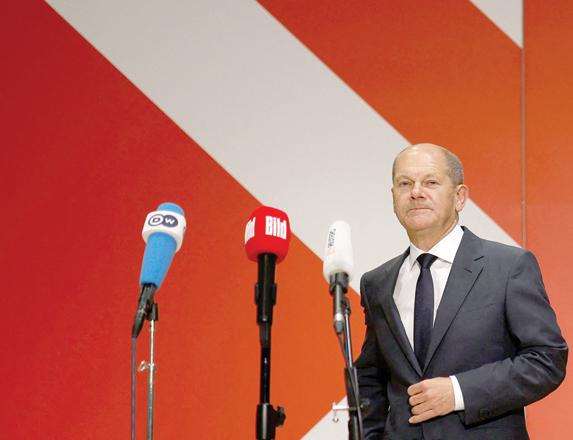You are here
Germany's Social Democrats win election but uncertainty beckons
By AFP - Sep 27,2021 - Last updated at Sep 27,2021

German Finance Minister, Vice-Chancellor and the Social Democratic SPD Party's candidate for chancellor Olaf Scholz (2nd left) waves ahead of an SPD leadership meeting at the party's headquarters in Berlin on Monday (AFP photo)
BERLIN — Germany slipped Monday into a period of political unpredictability after the Social Democrats narrowly won a general election but faced a rival claim to power from outgoing Chancellor Angela Merkel's conservative camp.
For a country synonymous with stability after 16 years of Merkel's steady leadership, the coming weeks and months promise to be a rocky ride as both Finance Minister Olaf Scholz's SPD and the conservatives led by Armin Laschet scramble for coalition partners.
The power struggle risks putting Germany out of play on the international scene for some time, even though the upcoming COP26 climate summit will be demanding action from the world's biggest powers.
Europe’s largest economy will also hold the presidency of the G-7 club of rich nations next year, and will need a government capable of setting the international agenda.
European markets nevertheless heaved a sigh of relief, climbing after the tight results, predicting that a government led by either the SPD or the CDU would bring continuity in economic policy.
Preliminary official results showed that the centre-left Social Democrats (SPD) narrowly won the vote at 25.7 per cent, while Merkel’s centre-right CDU-CSU bloc sunk to a historic low of 24.1 per cent.
The Green Party placed third at 14.8 per cent, its best result yet but still short of expectations.
Laschet, 60, took responsibility for his side’s poor showing and vowed “renewal in all areas”.
But he insisted that “no party” — not even the SPD — could claim a mandate to govern from Sunday’s outcome, as he said he was ready to head a coalition.
Scholz, 63, said the conservatives belonged in the opposition.
“The CDU and CSU have not only significantly lost votes, but they have essentially received the message from citizens — they should no longer be in government, but should go into the opposition,” he said.
Shrugging off the uncertainties in the quest for a governing majority, Scholz said Germany will not be thrown off by the power struggle that lies ahead.
“You should know that Germany always has coalitions, and it was always stable,” he said, adding that he aimed to pull together his coalition by Christmas.
From Paris, French minister for European affairs Clement Beaune stressed that France “has an interest to have a strong German government in place”, urging “swift” action from German parties.
The Kremlin said it hoped for “continuity” in Moscow’s ties with Berlin.
‘Fresh start’
While Germany will keep plodding along with a caretaker government still led by Merkel, analysts warn that Berlin will be paralysed on the international stage.
“Although it keeps managing all dossiers, it loses the legitimacy to shape international initiatives or domestic legal acts,” Christian Moelling of the German Council on Foreign Relations said.
“Until political leadership again becomes available, bureaucracy will get relatively stronger as it aims to conserve the status quo. Given the fragility of the international environment, this is not good news.”
In the fractured political landscape of the post-Merkel era, the most likely outcome will be a three-way alliance, ending the post-war tradition of two-party coalition governments.
Both Scholz and Laschet are wooing the Greens and the liberal, pro-business FDP Party (11.5 per cent) to cobble together a parliamentary majority.
The two kingmakers however are not natural bedfellows, diverging on issues like tax hikes and public investment in climate protection.
Green chancellor candidate Annalena Baerbock, whose party hoped to do better with the climate crisis a top voter concern this year — stayed vague about her preferred tie-up, but said it was time for “a fresh start” in the country of 83 million people.
FDP leader Christian Lindner has signalled a preference for a coalition with the CDU-CSU and the Greens, dubbed “Jamaica” in a nod to the colours of each party’s logo — black, green and gold — which are the same as the Jamaican flag.
Legacy
Ironically, the outgoing right-left coalition has enough support to form Germany’s next government, but under the leadership of the SPD.
However, the Social Democrats have gone into the race with the clear aim of avoiding a repeat of the partnership with Merkel’s conservatives.
No party will team up with the far-right Alternative for Germany, whose score fell to 10.3 per cent from nearly 13 per cent at the last election in 2017.
Should the complex coalition talks last beyond December 17, Merkel would overtake Helmut Kohl as Germany’s longest-serving chancellor since World War II.
Related Articles
BERLIN — Germany's centre-left Social Democrats (SPD) edged ahead in the race towards September elections on Tuesday, beating Angela Merkel'
FRANKFURT — Germany inched towards a government led by Olaf Scholz after the Greens and the liberal FDP party said Wednesday they would try
BERLIN — Olaf Scholz's hopes of forming Germany's next coalition government were given a boost Wednesday with congratulations from outgoing


















